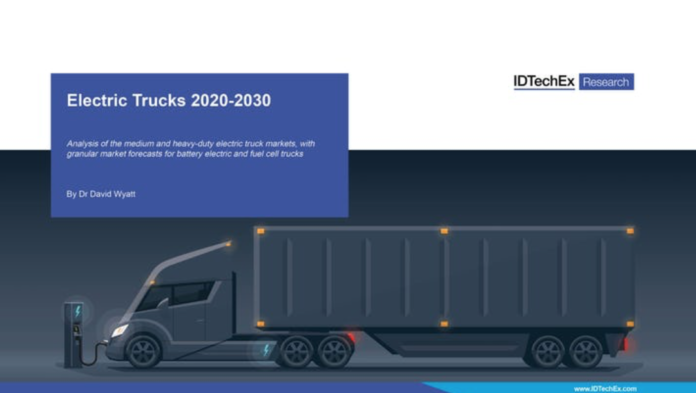According to IDTechEx’s new Electric Trucks 2020-2030 report, the medium- and heavy-duty truck market is transitioning toward an all-electric future.
Governments around the world, recognizing the repercussions of climate change and witnessing the detrimental impact on human health from vehicle exhaust pollutant emissions in urban environments, are taking decisive action that will, in the coming decades, drive vehicle manufacturers to zero on-road exhaust emission powertrain solutions. Consequently, the days of the fossil fuel-powered combustion engine are numbered.
Despite medium- and heavy-duty trucks representing only 9% of the global vehicle stock, large inefficient diesel truck engines combined with high average annual mileage mean that the truck sector contributes 39% of the transport sector’s greenhouse gas emissions, which equates to about 5% of all global fossil fuel-derived CO2 emission.
It is this disproportionate contribution to emissions that makes trucks a target for governments. If the global community is going to meet its targets to reduce greenhouse gas emissions and limit the impact of climate change, then it is clear that a rapid decarbonization of the truck sector must be a priority, the report says.
While CO2 emissions have arguably been the main force driving the move to zero on-road emissions freight, an ever-increasing body of evidence is also highlighting the damage that poor air quality is having on populations that are frequently exposed to harmful levels of air pollution.
In urban environments that are in close proximity to congested road infrastructure, transport-related emissions of nitrogen oxides (NOx) and particulate matter (PM) have been directly linked to increased morbidity and mortality. A 2019 report by the International Council on Clean Transportation (ICCT) linked vehicle emissions to 385,000 premature deaths worldwide in 2015, with the cost of the health impacts from vehicle emissions calculated at approximately $1 trillion.
Vehicle electrification offers a solution that effectively eliminates on-road exhaust emissions and passes the pressure of decarbonization on to electricity generation. Rather than monitoring the emission of millions of vehicles, the task then becomes one of governments managing the emissions of a limited number of large power stations, in combination with renewable sources, to reduce the carbon intensity of supplied electricity.
An increasing number of cities and nations around the world are targeting a complete phase-out of diesel and gasoline vehicles on their roads. The electrification of truck fleets, especially those operating in urban environments, is likely to happen rapidly, once the cost-benefit and ability of the technology to deliver the required daily duty cycles have been demonstrated.
To read a full executive summary of IDTechEx’s Electric Trucks 2020-2030 report, click here.




